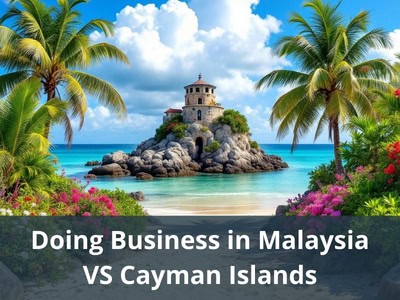Doing Business in Malaysia VS Cayman Islands – A Comparison
 Entrepreneurs and investors looking to expand in Asia or globally often weigh the pros and cons of Malaysia versus the Cayman Islands. Both locations are appealing for different reasons. Malaysia is widely recognised for its affordability, ease of starting a business in Malaysia, and strong digital infrastructure. The Cayman Islands, meanwhile, attract global investors with their zero-tax regime and offshore-friendly reputation. This comparison will help you decide which destination better suits your business objectives.
Entrepreneurs and investors looking to expand in Asia or globally often weigh the pros and cons of Malaysia versus the Cayman Islands. Both locations are appealing for different reasons. Malaysia is widely recognised for its affordability, ease of starting a business in Malaysia, and strong digital infrastructure. The Cayman Islands, meanwhile, attract global investors with their zero-tax regime and offshore-friendly reputation. This comparison will help you decide which destination better suits your business objectives.
Key Comparison Points
Business Environment
- Malaysia: Malaysia offers a stable, investor-friendly environment with government support for SMEs and digital transformation. Agencies like the Companies Commission of Malaysia (SSM) regulate incorporation and compliance.
- Cayman Islands: The Cayman Islands are known for financial privacy, ease of offshore structuring, and legal protections—but are limited in local business activity due to their small domestic market.
Taxation
- Malaysia: Malaysia imposes a 24% corporate tax rate, but most capital gains are not taxed. Incentives apply to various industries. More details can be found in this Malaysia company registration guide.
- Cayman Islands: The Cayman Islands levy no corporate tax, capital gains tax, or withholding tax—making them attractive for holding companies and global funds, but less practical for trading businesses targeting regional markets.
Ease of Company Incorporation
- Malaysia: Using MyCoID, incorporation is fast and digital. Foreigners can fully own companies in most sectors. For a smooth process, refer to company incorporation in Malaysia and company incorporation services by experts.
- Cayman Islands: Incorporation is simple and efficient, with no residency requirements, but involves working with registered local agents and higher compliance fees for certain structures.
Cost of Living and Business Operations
- Malaysia: Malaysia offers affordable office space, utilities, and skilled labor, making it ideal for cost-sensitive businesses. Those setting up businesses in Malaysia benefit from a balance of quality and affordability.
- Cayman Islands: The cost of living and operations is high due to its import-dependent economy, limited land, and high real estate prices.
Access to Markets
- Malaysia: Strategically located in ASEAN, Malaysia offers access to over 600 million consumers through RCEP, CPTPP, and ASEAN FTAs. Learn more via 3E Accounting and our services.
- Cayman Islands: Positioned in the Caribbean, the Cayman Islands are ideal for international holding structures but are disconnected from active trade routes in Asia or Latin America.
Quick Comparison Overview
Here’s a quick overview of the key differences for easy reference.
| Factor |
Malaysia |
Cayman Islands |
| Business Environment |
Stable, pro-SME, digitally enabled |
Offshore-friendly, small domestic market |
| Corporate Tax Rate |
24% |
0% |
| Capital Gains Tax |
Generally not applicable |
0% |
| Ease of Incorporation |
Fast, digital, foreigner-friendly |
Easy, via registered agents |
| Business Costs |
Low cost, high value |
High cost, limited infrastructure |
| Market Access |
Strong access via ASEAN and Asia-Pacific |
Limited local and regional trade access |

Benefits of Choosing 3E Accounting
Selecting the right partner is crucial when it comes to starting a business in Malaysia. At 3E Accounting, we offer a comprehensive range of solutions designed to simplify the entire process of company incorporation in Malaysia. From ensuring compliance with local regulations to providing expert guidance tailored to your specific needs, we make the journey seamless.
For entrepreneurs looking to navigate Malaysia company registration or explore company setup in Malaysia, our team provides unmatched expertise and support. Additionally, our company incorporation services are tailored to help you succeed in the competitive business environment.
With a deep understanding of the region’s business landscape, we also provide resources for setting up businesses in Malaysia, ensuring that every step is clear and efficient. Whether you need assistance with corporate secretarial or company secretary services, we are here to help.
To explore our services or discuss your business needs, contact 3E Accounting. With our strong presence in Malaysia and a proven track record, we are your trusted partner for success in Asia.
Ready to Expand into Malaysia? Choose 3E Accounting Today!
Stay Secure, Stay Successful With 3E Accounting Services
Contact Us Now
Frequently Asked Questions
Yes. Malaysia offers lower setup and operational costs, government incentives, and strong infrastructure. Here’s a full guide to starting a business in Malaysia.
Malaysia provides a fast and digital process through MyCoID. In contrast, Cayman Islands require working with local agents. Learn more in this Malaysia company registration guide.
Malaysia imposes a 24% corporate tax but has no capital gains tax in most cases. The Cayman Islands have a 0% tax regime, but lack access to regional markets and trade agreements.
Abigail Yu oversees executive leadership at 3E Accounting Group, leading operations, IT solutions, public relations, and digital marketing to drive business success. She holds an honors degree in Communication and New Media from the National University of Singapore and is highly skilled in crisis management, financial communication, and corporate communications.



